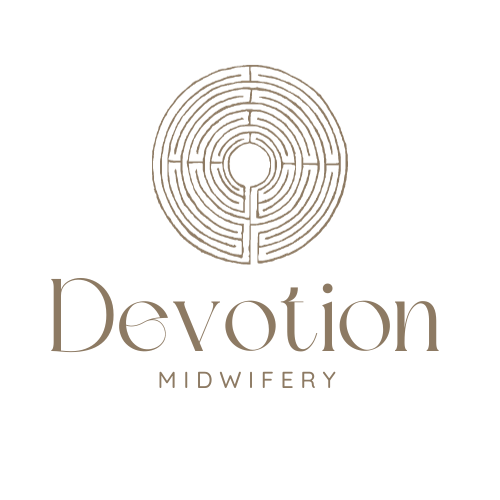
About Devotion
Devotion Midwifery believes that everyone deserves midwifery led care and our goal is to facilitate the best birth experience while creating opportunities for midwives and families for generations to come
About Devotion
We know through studies and experiences that the midwifery model of care is the safest and best option for all families, and the majority of the evidence points to the relationship of trust that breeds such positive outcomes. When Midwife Leila started Devotion Midwifery, it was designed as a single midwife practice in thoughts that that is the only way to keep that holy connection. Over the years, we learned that midwifery is best when layers of support are provided. As a team, we offer the same intimate one-on-one relationship, while also bringing in more strength, balance, and wisdom. This ensures your care remains deeply personal while your midwife remains well rested, always up to date of evidence and skill, and thriving for years and years to come.
Devotion Midwifery is a homebirth midwifery practice of two Licensed Certified Professional Midwives & six registered students.
We are also so excited to announce as of January 2026 we will also be joined by two IBCLCs, two perinatal mental healthcare providers, and more community partners.
Stay tuned for more!
“I believe in autonomy for both the midwife and the birthing families, and support licensed midwifery with full scope care, traditional midwifery, and attendants rooted in a lineage of cultural tradition, freebirth, and medical birth as desired. I believe in sovereign birth. I believe birth is a natural, normal event, that when respected, feared, and understood, rarely needs medical help but maintain skill and tools to do so and will not hesitate when needed.
I believe in anti-racism, inclusivity, and freedom.
Our philosophy of care is deeply rooted in these beliefs and will hold them on the highest of esteem in every part of care that we offer.”
-Leila Poland Wyatt, Owner & Midwife
Midwifery is an honorable role of service, protection, and devotion with the weight of wisdom, patience, and sacrifice, as a sherpa for matrescence. Midwifery work is activism.
Devotion Midwifery is an evidence based midwifery practice. What this means is that we value individual preferences, research, and professional experience as the perfect recipe for guiding principles of decision making.
Another cornerstone of our care is informed choice. Every step of the way we will be delivering options and choices and it is important that you have all of the information to make a solid choice. We fully support and respect your decisions, knowing that you are the best and final expert on your body and your baby.
We are continuously keeping up to date on evidence based research while maintaining perspective and remaining humble. Although we help guide your journey, you are in charge.
Louisiana is currently listed as the worst state in the nation for maternal mortality, neonatal mortality, cesarean sections, VBACs, STDs, poverty, and women’s rights. Even more, while these statistics seem like the biggest hurdle, there are only a handful of licensed practicing midwives in the state. Blatant systemic racism and fear of midwifery has been present for decades. Current regulations stand to bar midwives from attending VBACs, using their full scope, and offering well person care.
In 2025, Leila and Laura have worked with other midwives to create the Louisiana Midwives Association, a NACPM chapter to aid legislative efforts for improving the midwifery law and rule to better serve the community, remove the obstetric risk assessment criteria, allow VBACs, and improve our drug formulary. Look forward to more from the LMA soon! Additionally, Leila’s focus on training more midwives allows for a louder voice for women and birthing people in Louisiana.
By 2030 Leila hopes to open a New Orleans Easy Access clinic to offer the midwifery model of care to every person every time. This is with the intent of caring for low socioeconomic communities, marginalized groups, and reducing poor obstetrical outcomes associated with the standard medical and pathological model of care for pregnancy and birth.








